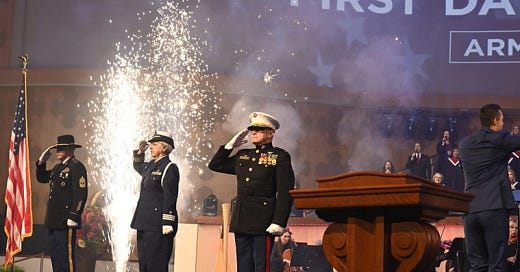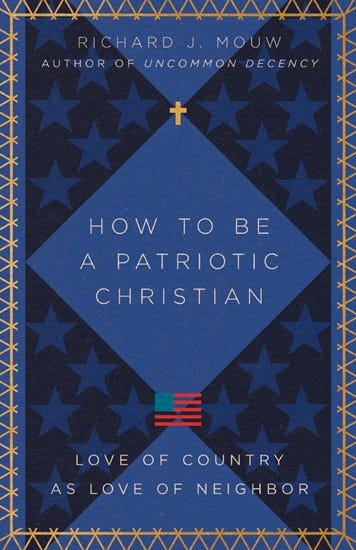This past week, First Baptist Dallas got an early start to Independence Day with its annual “Freedom Sunday.” The church’s website advertised a celebration of “our freedom as Americans and our freedom in Christ” with “powerful worship, a salute to our armed forces, and more.”
This sort of imagery calls to mind Christian nationalism, which Samuel Perry describes as “a fusion of American identity symbolism, policies, and sacred values with an expression of Christianity that is shaped by White conservative, nativist understandings of what it means to be an American.” The phenomenon is most prevalent in white evangelical and Pentecostal churches, though Christian nationalists are also found in mainline Protestant churches and, increasingly, altogether outside of churches.
In the past few years, Christian nationalism has been extensively critiqued in books like Perry and Andrew Whitehead’s Taking America Back for God: Christian Nationalism in the United States, Anthea Butler’s White Evangelical Racism: The Politics of Morality in America, Kristin Kobes Du Mez’s Jesus and John Wayne: How White Evangelicals Corrupted a Faith and Fractured a Nation, and John Fea’s Believe Me: The Evangelical Road to Donald Trump, among others.
More recently, Paul Miller’s The Religion of American Greatness: What’s Wrong with Christian Nationalism contrasts nationalism with a more positive form of patriotism. The differences between nationalism and patriotism matter. But many churches conflate them in their worship and cultural liturgies.
In the News
The nationalistic undertones of Freedom Sunday are nothing new for First Baptist Dallas or its pastor, Robert Jeffress. In a 2018 profile of Jeffress, Ruth Graham observed that the church was “defined by its enthusiastic blend of piety and patriotism,” noting that the choir had recently performed an original song titled “Make America Great Again.”
The 13,000 member church is by no means an outlier in its blurring of Christianity, patriotism, and conservative politics. This week, Christian musician Natasha Owens releases her new album, “American Patriot.” Reflecting on the album, Owens notes:
I love this country so much. I can’t look at a flying flag without tearing up. It’s the same way for me when I see a cross. We owe everything to God for saving us on the cross. But we owe all of our freedom to the military men and women. Freedom is the most expensive thing we own, and most of us, including me, have not earned it. Every year, our society keeps moving further away from God and further away from patriotism.
According to an article about American Patriot, Owens “has been making regular appearances on the conservative circuit in recent months, including frequent visits to Mar A Lago and a main stage appearance at CPAC 2022 in Orlando.”
In my Head
I worry about the dangers of Christian nationalism and the role of churches in its cultivation. That said, it would be helpful for critics and commentators to make better distinctions between nationalism and patriotism. It’s civically uncharitable and politically shortsighted to assume or imply that all white evangelicals are Christian nationalists or that every display of patriotism fuels nationalism.
We can meaningfully appreciate our country without celebrating it too much or holding it beyond critique. Some civic rituals helpfully call us to shared commitments and remind us of our common ground. Just yesterday, I attended a military ceremony marking the retirement of my college roommate following his twenty-five years in the Air Force. I found both the ceremony itself and my friend’s public remarks useful reminders of measured patriotism in service to our country.
But excessive reverence for the nation and its symbols, especially within churches, opens the door for civic appreciation to turn into civic worship. Patriotic-themed church services, exalting or platforming political leaders from the pulpit, and distorting scripture toward political ends are all indicators that something is awry.
Another example is the presence of the American flag in some houses of worship. Flags can be particularly emotive symbols. As Justice Robert Jackson wrote in his famous opinion in West Virginia v. Barnette: “The use of an emblem or flag to symbolize some system, idea, institution, or personality is a short-cut from mind to mind.” Jackson also noted that flags command “appropriate gestures of acceptance or respect: a salute, a bowed or bared head, a bended knee.”
Threats to the flag are sometimes interpreted as threats to the sacred. We see this in the historic persecution of Jehovah’s Witnesses after they refused to participate in the pledge of allegiance. We also see it in more recent reactions to kneeling in protest during the national anthem. As a military veteran myself, I understand the impulse to honor and defend the American flag. But I also honor and defend the right to protest that flag and what it stands for. And I worry about nationalist tendencies—worship of country rather than qualified love of country—that lie beneath some of the resistance to these protests.
Removing the American flag from houses of worship where it still resides might be one way to nudge worshippers toward a healthier version of patriotism. In theory, eliminating a non-religious symbol from worship spaces should be relatively uncontroversial. If such a decision provoked fierce resistance from worshippers, church leaders could host dialogues and studies to see whether there is any theological justification for including the flag in worship.
More generally, church leaders should engage directly with adherents whose words, actions, and social media posts reflect the dangers of nationalism rather than the bonds of patriotism. Part of forming people toward a love of God is helping them reject false idols. In some churches, even some that look nothing like First Baptist Dallas, this kind of formation has been neglected far too long.
In the World
I often find myself wary of patriotic practices, not all of which are bad. For this reason, I am grateful for my friend Rich Mouw’s new book, How to Be a Patriotic Christian: Love of Country as Love of Neighbor.
Rich notes that his own understanding of how to be patriotic as a Christian is a work in progress. He doesn’t offer a “how-to-guide” but urges readers to “keep wrestling with the questions.” Questions like:
What does it mean to “love” our nation? If, as the Bible says, “the powers that be” are “ordained by God,” does that mean we should not criticize them? What about expression of patriotism in our church worship? And what about using religious language in events celebrating national holidays? Is “civil religion” a bad thing? What does all of this mean in times like ours, when we are experiencing deep polarizations?
Rich suggests that we should “talk together about the proper ways to show love for our country.” In doing so:
. . . we can agree—we must agree—that many of us have benefitted from these blessings at the expense of others who have suffered greatly in our nation’s history. This means that a legitimate love for America cannot be nurtured without also grieving and repenting for the things in our nation and its history that are unlovable.
Rich is writing specifically to Christians, but his book will be of interest to those writing about Christian nationalism as well as to people of other faiths working to figure out the relationship between their theological and political commitments.







John I am really appreciating your substack -- thanks for sharing your illuminating POV on these thorny matters!
Thanks for writing this John. I enjoy your thoughtful and measured view of the topic.